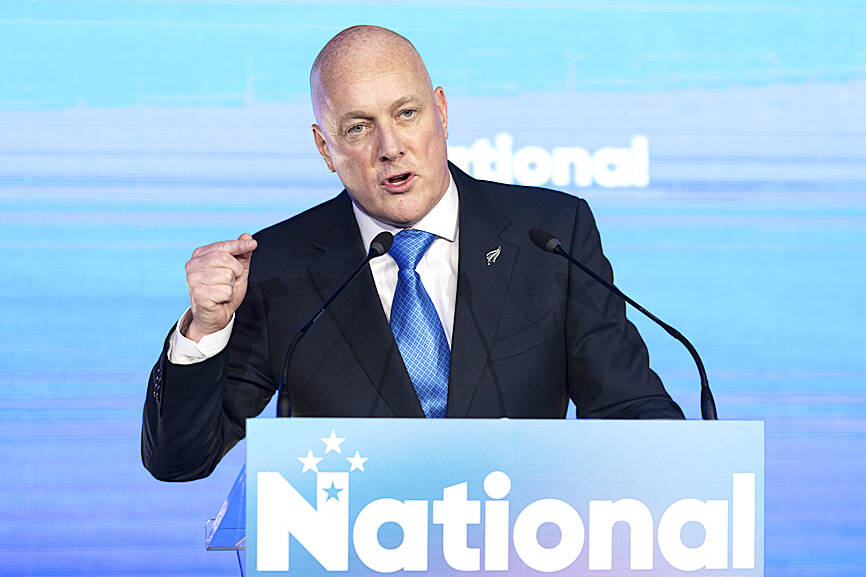The removal of basic Maori phrases — kia ora, meaning “hello” and Aotearoa, the Maori name for New Zealand — from a lunar new year invitation to an Australian official was not a snub of the indigenous language by New Zealand’s government, New Zealand Prime Minister Christopher Luxon said on Wednesday, seemingly joking that it instead reflected the “incredibly simple” language required when speaking to Australians.
Luxon defended in parliament a lawmaker who ordered the removal of the Maori words from an invitation sent to Australian Minister for the Arts Tony Burke.
He appeared to indulge in a favorite pastime of New Zealanders, who enjoy a friendly rivalry with their closest neighbor: calling Australians stupid.

Photo: AP
“In my dealings with Australians, it always pays to be incredibly simple and clear, and use English,” Luxon said, referring to the invitation sent to Burke.
Ripostes between lawmakers across the Tasman have precedent. In the most famous example, then-New Zealand prime minister Rob Muldoon quipped in the 1980s that New Zealanders who migrate to Australia “raise the IQ of both countries.”
Australian Prime Minister Anthony Albanese yesterday responded to Luxon with a favorite Australian joke — that no one can understand the New Zealand accent.
Albanese said that at times interpreters were needed, perhaps diplomatically adding that he had sometimes “missed” things said by Luxon’s predecessors, too.
“Look, we’re great friends and we’re great mates,” he said. “Sometimes though we do speak a different language and that’s when we both think we’re speaking English.”
The invitation was to an event for Matariki, the Maori lunar new year, which was established as a nationwide public holiday in 2020.
It falls on June 20 next year.
A spokesperson for Burke told reporters that he had known the meaning of the word Aotearoa since 1982, when it was referenced in the lyrics of a popular song by New Zealand band Split Enz.

ANGER: A video shared online showed residents in a neighborhood confronting the national security minister, attempting to drag her toward floodwaters Argentina’s port city of Bahia Blanca has been “destroyed” after being pummeled by a year’s worth of rain in a matter of hours, killing 13 and driving hundreds from their homes, authorities said on Saturday. Two young girls — reportedly aged four and one — were missing after possibly being swept away by floodwaters in the wake of Friday’s storm. The deluge left hospital rooms underwater, turned neighborhoods into islands and cut electricity to swaths of the city. Argentine Minister of National Security Patricia Bullrich said Bahia Blanca was “destroyed.” The death toll rose to 13 on Saturday, up from 10 on Friday, authorities

Two daughters of an Argentine mountaineer who died on an icy peak 40 years ago have retrieved his backpack from the spot — finding camera film inside that allowed them a glimpse of some of his final experiences. Guillermo Vieiro was 44 when he died in 1985 — as did his climbing partner — while descending Argentina’s Tupungato lava dome, one of the highest peaks in the Americas. Last year, his backpack was spotted on a slope by mountaineer Gabriela Cavallaro, who examined it and contacted Vieiro’s daughters Guadalupe, 40, and Azul, 44. Last month, the three set out with four other guides

Local officials from Russia’s ruling party have caused controversy by presenting mothers of soldiers killed in Ukraine with gifts of meat grinders, an appliance widely used to describe Russia’s brutal tactics on the front line. The United Russia party in the northern Murmansk region posted photographs on social media showing officials smiling as they visited bereaved mothers with gifts of flowers and boxed meat grinders for International Women’s Day on Saturday, which is widely celebrated in Russia. The post included a message thanking the “dear moms” for their “strength of spirit and the love you put into bringing up your sons.” It

DISASTROUS VISIT: The talks in Saudi Arabia come after an altercation at the White House that led to the Ukrainian president leaving without signing a minerals deal Ukrainian President Volodymyr Zelenskiy was due to arrive in Saudi Arabia yesterday, a day ahead of crucial talks between Ukrainian and US officials on ending the war with Russia. Highly anticipated negotiations today on resolving the three-year conflict would see US and Ukrainian officials meet for the first time since Zelenskiy’s disastrous White House visit last month. Zelenskiy yesterday said that he would meet Saudi Arabian Crown Prince Mohammed bin Salman, the nation’s de facto leader, after which his team “will stay for a meeting on Tuesday with the American team.” At the talks in the Red Sea port city of Jeddah, US